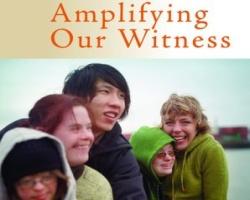We seek to be “communities where people whatever their race, religion, culture, abilities or disabilities, can find a place and reveal their gifts to the world.”
—Jean Vanier
Benjamin T. Conner
Wm. B. Eerdmans Publishing Company, 2012, 166 pp., $16
Amplifying Our Witness: Giving Voice to Adolescents with Developmental Disabilities, by Benjamin Conner is a book for churches that want to minister to those with developmental disabilities and want guidelines on how to include them in the fold. Inclusion is the key and the biggest challenge. That word has been in the vernacular for a long time, but only recently has it become a buzzword. One of the worst things a church can do toward people with disabilities is send the message that they don’t belong. One of the best things a church can do is provide them with a support network.
Disability advocacy is a calling and an important part of community building. When I was told that people with disabilities are a metaphor for God’s grace, I began to see them in a whole new light. Read Amplifying Our Witness and you will, too. If a church really believes in ministering to the disabled, that should be incorporated into their mission statement. How each church applies this is up to that specific church, but that is what makes each ministry unique.
Benjamin Conner is a teacher at Memphis Theological Seminary. This book is based on his experiences of what works when trying to incorporate those with disabilities into the community.
Knowing who is influencing Benjamin Conner helps to understand his worldview. Henry Nouwen is quoted in the book, along with other high-profile members of Christendom. (i.e. Lesslie Newbigin, Stanley Hauerwas, ect..) The book is short and is good for those who want the best practices for inclusion within the church.
There are several ministries that specialize in working with the disabled. Two good examples are The Arch and Joni and Friends.




